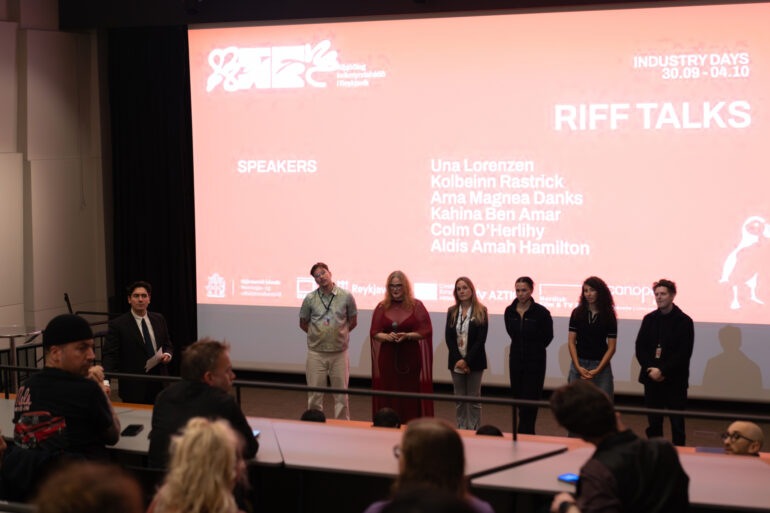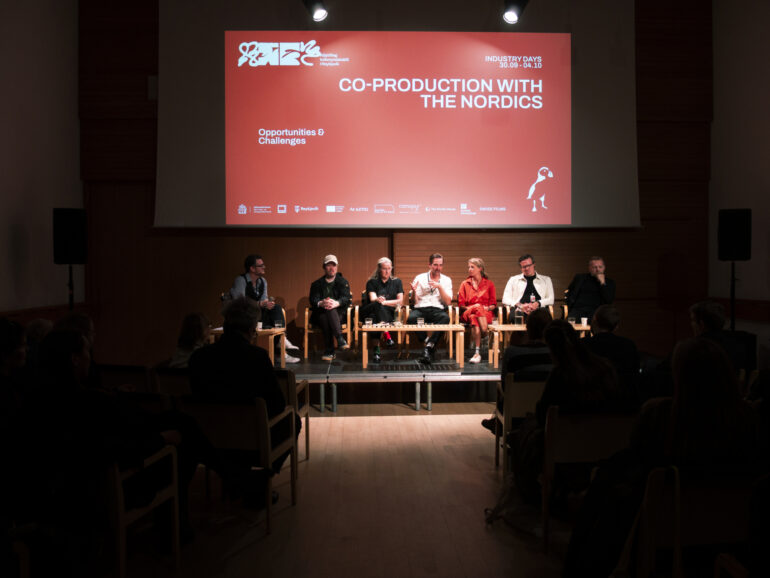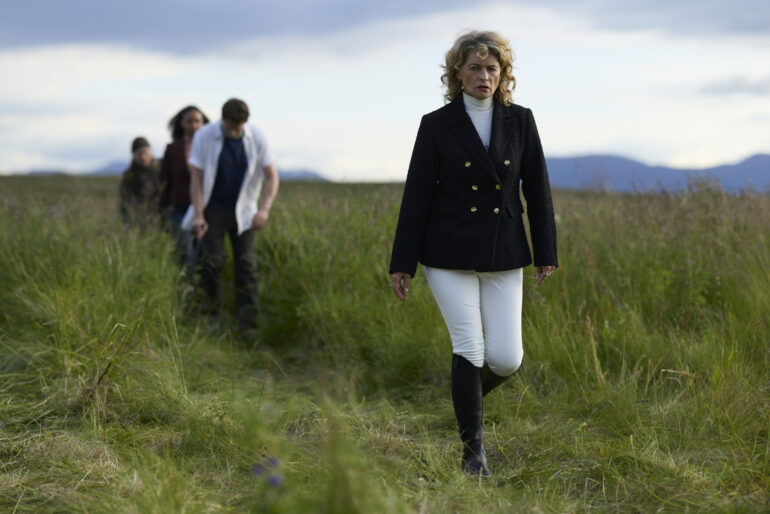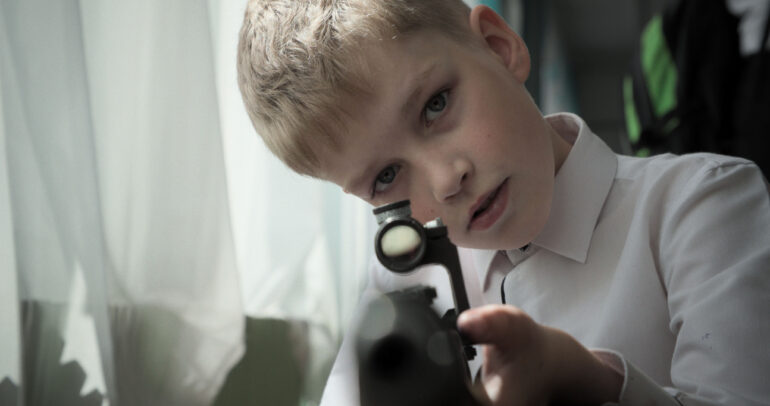WRITTEN BY: Davide Abbatescianni
Framed by the hum of creative exchange, this year’s edition balanced emerging talent with industry insight, bringing together filmmakers, students, and professionals across the wider Northern European industry.
The 22nd edition of the Reykjavík International Film Festival (RIFF), which unspooled from 25 September to 5 October, once again confirmed the Icelandic event’s dual identity as a key fixture on the autumn calendar for both audiences and the Northern European film industry at large.
In conversation with Nordisk Film & TV Fond (NFTVF), Festival Director Hrönn Marinósdóttir reflected on how the gathering’s positioning has evolved within the regional and international landscape. “RIFF has evolved into a distinctive discovery platform with a sharpened focus on first and second features in its New Visions competition, firmly establishing itself in the international talent-discovery lane while complementing the Nordic circuit,” she explained. “Every year, RIFF manages to bring outstanding guests to present films and take part in the Industry Days programme. Beyond its competitions, RIFF has cultivated a unique identity through initiatives such as our YouthRIFF programme, screenings around the country, and RIFF Around Town, which brings screenings and site-specific events into the broader community.”
This community-integrated model, now a defining trait of RIFF, allows the festival to maintain a strong local presence, while also expanding its global visibility. The 2025 edition, Marinósdóttir emphasised, “reinforced Reykjavík’s role as a strategic meeting point for both Nordic and global partners”.
A growing industry platform
RIFF’s Industry Days has grown steadily into one of the most dynamic professional hubs in the Arctic-Nordic circuit. This year’s goals, Marinósdóttir said, were to “shed a light on what is well done in Iceland, highlight Nordic co-production pathways, elevate women’s leadership and below-the-line visibility, create pragmatic matchmaking between producers, sales agents, and festivals, and connect Icelandic projects with international partners at an early stage”.
The 2025 Industry Days offered a comprehensive blend of policy, craft, and market discussion, anchored by RIFF Talks, the panel on curation and programming Framing Film, the Co-production with the Nordics talk, and a lively Women in Film session. A mixed-media conversation with Anton Corbijn – which linked photography, music, and cinema – became one of the most popular events of the programme. “The co-production forum in particular resulted in tangible follow-up meetings and next steps for projects in development,” noted Marinósdóttir.
One of the event’s signature elements, the Industry Trip, once again served as a catalyst for informal networking. Visits to Hvammsvík Hot Springs and Þórufoss facilitated what Marinósdóttir called “deeper connections among producers, press, and partners in a relaxed and inspiring setting”. Meanwhile, the Young Nordic Voices Think Tank - now in its second year - also played a vital role in embedding the next generation of filmmakers into professional exchanges. “It provided a unique platform for 18–25 year old creatives to spend structured time with mentors,” she added, ensuring that “new perspectives fed directly into industry discussions”.
Spotlight on emerging talent: The Work in Progress showcase
A highlight of the Industry Days, the Work in Progress showcase on 3 October, offered a vivid snapshot of ten upcoming Northern European productions – including Nordic and Arctic ones – confirming RIFF’s commitment to cross-border storytelling.
From Iceland, Colors (Litir) by Ísak Hinriksson and producer Bergþór Másson presented a heartfelt music documentary about rapper Birnir, freshly out of alcohol rehabilitation and finding redemption through art. With 5 million ISK confirmed and 25 million ISK still sought, the project resonated as both personal and emblematic of Iceland’s thriving music-driven nonfiction scene.
Equally intriguing was the Greenlandic horror feature Minikka, from director Flaminia Graziadei and producer Dudo Rae. The pic’s haunting premise - of a young woman returning as a supernatural avenger - places trauma and resilience against the country’s vast, mythic landscapes. Still seeking its €500,000 financing, Minikka marks a rare blend of folklore and feminist genre filmmaking from the Arctic.
Sweden and Norway were represented by Porcelain (Porslin), a poetic documentary on identity and belonging from Sámi filmmaker Ann Holmgren Aurebekk, staged by Andreas Emanuelsson of Iris Film. With €475,000 confirmed and €615,000 required, the project stood out for its multi-layered reflection on life, death, and ancestral connection.
On the serial side, Death of a Horse (Bless Bless, Blesi) united Icelandic heavyweights Hafsteinn Gunnar Sigurðsson and Óskar Þór Axelsson for a 6x52-minute crime drama set in the world of competitive horse-riding. With a €7 million budget already secured, the project - led by ACT4 - generated strong market interest for its polished concept and export potential.
Other highlights included Anda, a Faroese youth drama exploring friendship, heartbreak, and sexual confusion among college students; Polyorama, an Icelandic dramedy helmed by Graeme Maley and produced by Arnar Benjamín Kristjánsson, starring Edda Björgvinsdóttir and Sean Harris, now in post-production; and Under Endless Skies, a Germany-Iceland road movie weaving magical realism into the Ring Road’s rugged beauty. Rounding off the Nordic-Arctic slate was A Year Without Summer (Ein Jahr ohne Sommer), the new historical drama by Swiss director Flurin Giger, produced by Aline Schmid of Beauvoir Films, seeking a Scandi co-producer for its 19th-century survival tale.
Youth, community and continuity
Youth engagement remains a cornerstone of RIFF’s long-term vision. “Youth RIFF has grown from being a sidebar to becoming an integrated track that involves youth council input, collaborations with schools, and outreach to rural areas,” Marinósdóttir said. The next step, she revealed, will be to expand hands-on workshops in editing and sound, and to formalise mentoring between Youth RIFF alumni and filmmakers competing in New Visions.
RIFF’s sense of continuity also extends to its venues and partners. “We screen our films at Háskólabíó – University Cinema, one of Reykjavík’s most respected cultural houses,” added Marinósdóttir. “It’s the perfect cinema for us, with five screening rooms and a total capacity of around 1,700 seats.” The festival enjoys backing from both public funders and private sponsors such as Astiq and the Iceland Hotel Collection by Berjaya, alongside a Creative Europe MEDIA grant. “Not many festivals in Iceland have such strong private partners,” she noted, “which shows we are trusted for what we do.”
Looking ahead, RIFF plans to expand its Industry Days and YouthRIFF, potentially adding a Nordic-Icelandic Works-in-Progress Morning for quick pitches and a Craft Series focusing on sound, colour, and VFX under Nordic lighting conditions. “It’s a small country,” Marinósdóttir concluded, “but having a film festival like RIFF is not something to take for granted. It’s a lot of work to build this up, and I’m very proud of what our team of 20 staff and volunteers has achieved this year.”
Celebrating the standouts: key titles and winners of RIFF 2025
At the closing ceremony held on 5 October at Bíó Paradís, Jaume Claret Muxart’s Strange River (Estrany riu) took home the coveted Golden Puffin in the New Visions competition, hailed by the jury as “a complex symphony of unspoken yet deeply perceived emotions”.
Solomamma by Janicke Askevold earned a Special Mention for its moving portrayal of single motherhood. In the A Different Tomorrow competition, Mr. Nobody Against Putin by Pavel Talankin and David Borenstein was recognised for its rare insight into propaganda and war. The Young People’s Jury honoured Put Your Soul on Your Hand and Walk by Sepideh Farsi for its intimate resistance narrative.
In shorts, The Mine (L’Mina) by Randa Maroufi triumphed as Best International Short, whilst Memory Traces (Minningaspor) by Gríma Irmudóttir scooped Best Icelandic Short. The Golden Egg competition award went to Fadeaway by Brendan Prost, underscoring RIFF’s continuing role as an incubator for emerging voices.
Icelandic audiences enjoyed a raft of impact talks and some of the hottest Nordic titles on offer, including festival hits such as The Ground Beneath Our Feet (Jörðin undir fótum okkar), The Last Paradise on Earth (Seinasta paradís á jørð) and A Light That Never Goes Out (Jossain on valo joka ei sammu), Valemon: The Polar Bear King (Kvitebjørn), powerful docs such as Flophouse Amerika, Teenage Life Interrupted (Uten synlige tegn) and the Nordic Council Film Prize nominated WALLS – Akinni Inuk, as well as new local discoveries such as Anorgasmia and Hidden People (Skriti ljudje).
Alongside Corbijn, revered guests included legendary actress Kim Novak, Thai auteur Apichatpong Weerasethakul, and Iranian New Wave filmmaker Mohsen Makhmalbaf.
From its full houses to the dynamic Work in Progress slate and youth engagement strategy, RIFF 2025 reflected a festival both anchored and ambitious, deeply Nordic, yet globally attuned.
The Reykjavik International Film Festival Industry Days 2025 is supported by NFTVF.



